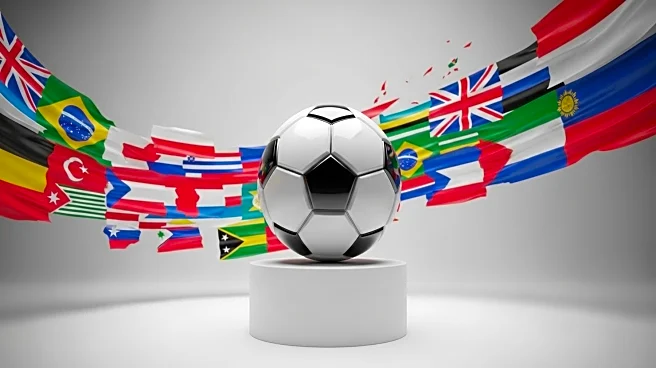What's Happening?
FIFA President Gianni Infantino has expressed his approval of the new official match ball for the 2026 World Cup, named TRIONDA. Developed by the German company adidas, the ball is designed to embody the unity and passion of the host nations: Canada, Mexico, and the United States. Infantino praised the ball's design and expressed excitement about its use in the upcoming tournament. The 2026 World Cup will be unique as it will be hosted by three countries simultaneously, with the tournament scheduled to take place from June 11 to July 19.
Why It's Important?
The introduction of the TRIONDA ball for the 2026 World Cup is significant as it symbolizes the collaboration and shared enthusiasm among the host nations. This event marks the first time the World Cup will be hosted by three countries, reflecting a broader trend of international cooperation in major sporting events. The design and development of the ball by adidas also highlight the ongoing partnership between FIFA and leading sports manufacturers, which plays a crucial role in enhancing the quality and experience of the tournament. The successful implementation of this new ball could set a precedent for future tournaments, influencing how equipment is designed to reflect cultural and regional themes.
What's Next?
As the 2026 World Cup approaches, further details about the tournament's logistics and preparations are expected to emerge. Stakeholders, including FIFA, the host nations, and adidas, will likely continue to collaborate to ensure the event's success. The focus will be on promoting the tournament's theme of unity and passion, potentially influencing marketing strategies and fan engagement activities. Additionally, the performance of the TRIONDA ball during pre-tournament matches and its reception by players and teams will be closely monitored, providing insights into its impact on gameplay.
Beyond the Headlines
The choice of the TRIONDA ball for the 2026 World Cup also raises questions about the role of sports in fostering international unity and cultural exchange. By emphasizing the shared values of the host nations, FIFA and adidas are contributing to a narrative that positions sports as a platform for diplomacy and global cooperation. This approach may influence future decisions regarding the selection of host countries and the thematic elements of international sporting events, potentially leading to more inclusive and diverse representations in global sports.









